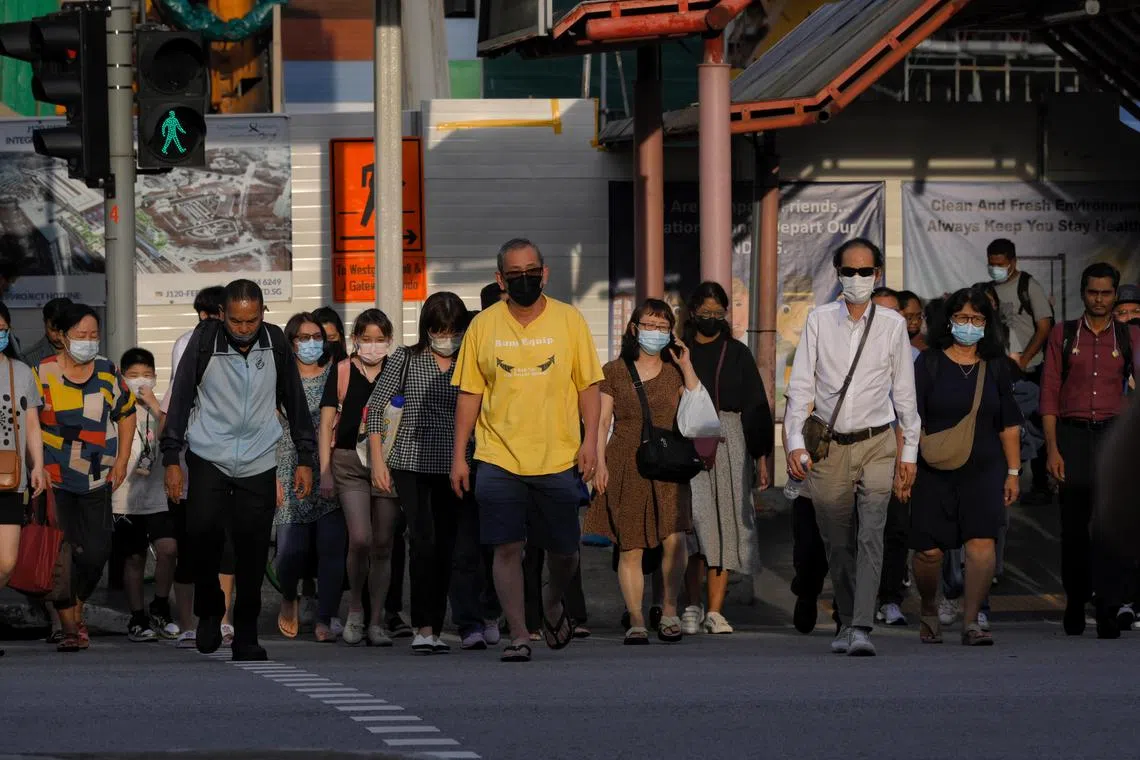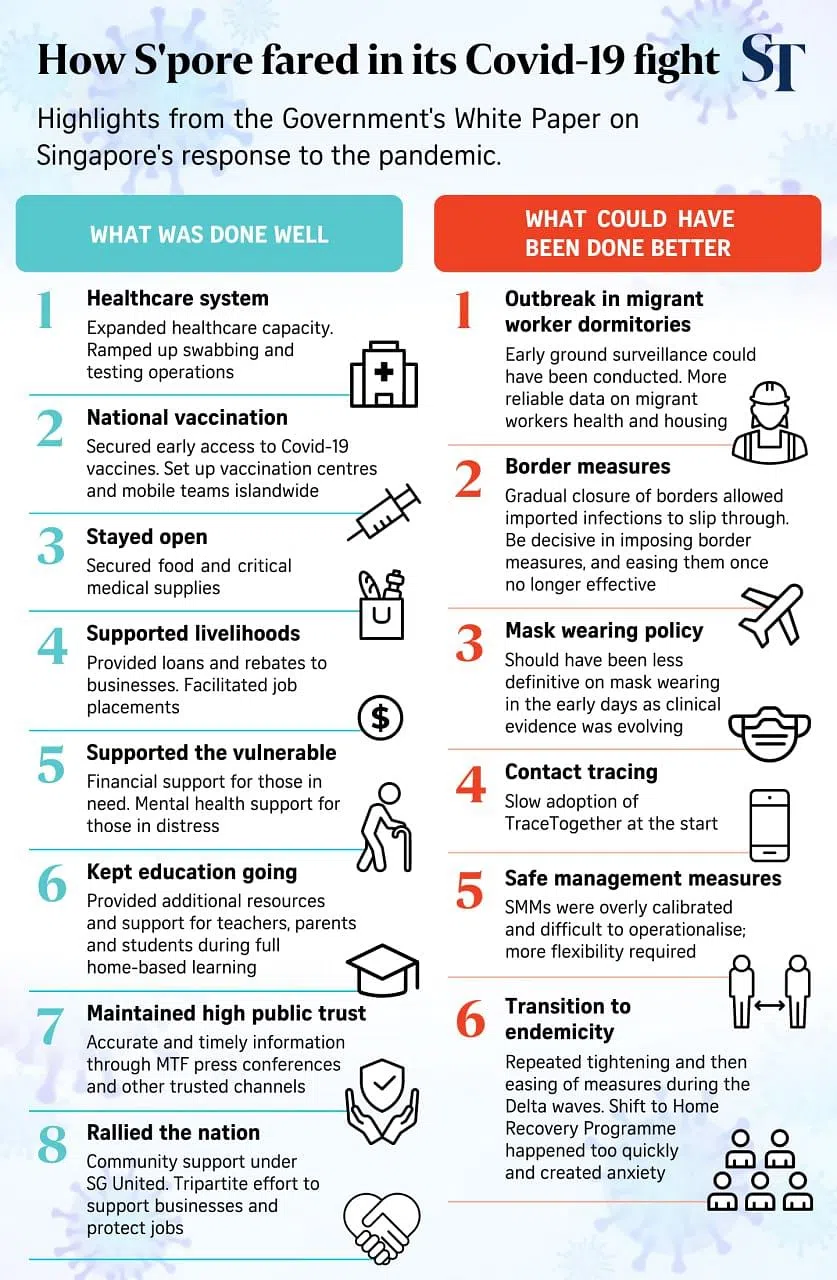7 in 10 S’pore residents in good shape post-pandemic; youth, caregivers see drop in quality of life: Poll
Sign up now: Get ST's newsletters delivered to your inbox

75 per cent said they were confident that Singapore would be able to get through the next pandemic.
ST PHOTO: MARK CHEONG
Follow topic:
SINGAPORE – Most Singapore residents said they emerged from the Covid-19 pandemic in good shape, but a higher proportion of young people and those who care for the elderly and children reported a drop in their quality of life compared with before the pandemic.
Meanwhile, about seven in 10 who took part in an online poll commissioned by the Ministry of Communications and Information (MCI) believe that the Government and its healthcare system can manage future pandemics well.
In all, 75 per cent said they were confident that Singapore would be able to get through the next pandemic, with 71 per cent saying they trust the Government to know what to do.
Similarly, 72 per cent felt that their overall quality of life was the same or better in 2023 than in 2019, before the pandemic hit.
The poll – the results of which were released on Sunday – reached out to 1,052 Singapore residents aged 15 years old and above to ask about the impact the pandemic has had on various aspects in their lives.
Notably, 82 per cent of Singapore residents reported that relationships with their neighbours became stronger or remained the same over the pandemic, with 77 per cent of the respondents noting the same for family relationships.
A total of 72 per cent of respondents reported that they were either equally or better able to cater to their financial needs post-pandemic.
The survey found that even among the 28 per cent who felt that their overall quality of life was worse than before the pandemic, at least six in 10 rated 10 aspects of their current lives the same or better.
These include relationships with family and neighbours, being able to manage mental and physical health, and having a healthy work-life balance. This is suggestive of a general recovery, said MCI.
Drop in quality of life for the young and caregivers
The poll found that a higher proportion of 15- to 19-year-olds reported a drop in their quality of life – 38 per cent for young people, compared with 28 per cent for the general population.
Similarly, 37 per cent of young people highlighted a drop in ability to manage their mental health, against 28 per cent for the general population.
“This suggests that the impact of Covid-19 restrictions on social activities was more keenly felt by the young, especially teenagers,” said MCI.
For example, 40 per cent of youth, compared with 28 per cent of the general population, reported that their relationships with friends were poorer compared with before the pandemic.
The survey also found that compared with the general population, those who have seniors and children in their households reported a poorer quality of life now than before the pandemic.
The report showed that 18 per cent of those with multiple dependants rated their overall quality of life now to be poor or very poor, compared with the 10 per cent of the general population who rated the same.
Addressing the findings of the poll, Minister for Communications and Information Josephine Teo said in a LinkedIn post: “Covid-19 was a very bleak period for many of us. It was a time of heartache as our gatherings with family and friends were restricted, a time of anxiety as our daily activities had to adjust along with the uncertainties of the pandemic.”
But she noted that amid the darkness, kindness, generosity and consideration were brought to the fore.
“Singaporeans rallied together to support one another, materially and in spirit. Many stepped forward to help the vulnerable, among other things, to get broadband and laptops to work and learn from home,” she added.
Mrs Teo also noted that social capital had strengthened over the course of the pandemic. Trust between citizens and the Government, and trust among citizens also strengthened.
On March 8, Singapore issued a public report on the fight against Covid-19

The 92-page White Paper listed eight things that Singapore did well. This included not letting the healthcare system get overwhelmed and saving lives and livelihoods. The country also did well to procure and roll out vaccines for the population.
There were, however, six aspects that could have been better handled. For example, safe management measures were over-calibrated and not always consistent, and there were slip-ups in handling outbreaks in migrant workers’ dormitories.
The White Paper concluded that this crisis of a generation showed Singapore, and the world, what Singaporeans are capable of when faced with a severe existential test.
The White Paper will be debated in Parliament on Monday.
“I am glad that we are finally seeing some light at the end of this long tunnel,” said Mrs Teo in her LinkedIn post.
“Even as we emerge stronger from the Covid-19 pandemic, we should do our best to sustain this high level of trust and social capital so that we can draw on this deep reservoir of trust to deal with the next crisis.”


